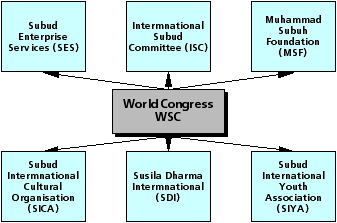|
How does WSA work?
So long as our founder Muhammad Subuh was alive, we were given his
guidance and direction on how to conduct the business of the Subud
Community. He left behind a framework to carry forward the work
he started.
Every 4 or 5 years the WSA holds a world congress to review its
activities and formulate future programs. The World Subud Congress
consists of both Kejiwaan (helper) and organisational delegates
from each national organisation, and this is the ultimate governing
body.
The World Subud Council (WSC) has been established to carry out
the decisions of one congress until the next, and consists of the
organisational representatives of the zones, the affiliated bodies
representing welfare, cultural, youth and entrepreneurial activities
(Wings), the international helpers and a chief executive called
the Executive Committee. A meeting of the WSC is
like a miniature Congress.
 |
 |
The basic principles underlying this structures are quite simple
and are uniform throughout all levels of the Subud organisation.
The structure in Subud is organic. Individual members get together
and become groups, groups become regions, then nations; national
bodies support one another, and comprise an international body:
the WSA. So that Subud members can voice their concerns and suggestions,
and to allow decisions taken between Congresses to be democratic,
the organisation has representatives at each layer.
A group will choose a chairperson to represent their concerns within
the regional or national body; and likewise the chairperson of the
national body represents the nation within the zonal council and
the chairperson of the zonal council represents the views of the
zone within the World Subud Council. Selection is usually subject
to testing.
Despite some terminological differences, the international organisation
of Subud is very similar to the national.
Each body is responsible to the cells of which it is composed. The
international organisation represents national bodies, just as a
group represents its members.
The organisation has grown in this way, following the advice of
its founder, so that it belongs to the members, who can thus
participate in the formulation and development of a common mission.

In order for Subud democracy to function, a clear organisational
framework must be maintained, which can effectively air the views
of members everywhere. Therefore, the Executive Committee has no permanent headquarters
and moves to another country after each World Congress, to prevent
monopoly of the executive function by any one nation. It also requires
an enormous collective effort to keep national committees and interested
members informed, to iron out misunderstandings, answer questions
and act on suggestions. For this reason, zonal representatives often
visit national congresses and stay in touch with the national committees
in their Zones. There is an allocation in the WSA budget to subsidise
their communication costs. In addition, WSC meets annually to pool
this information and to plan its work for the forthcoming year.
Although these meetings are expensive, without them the WSC could
not work.
|
 |